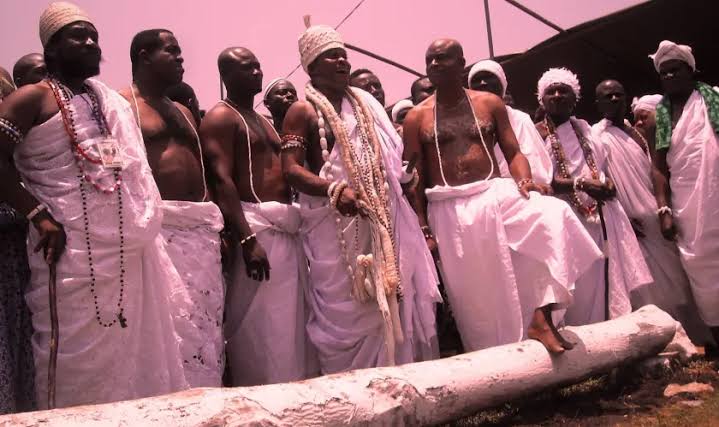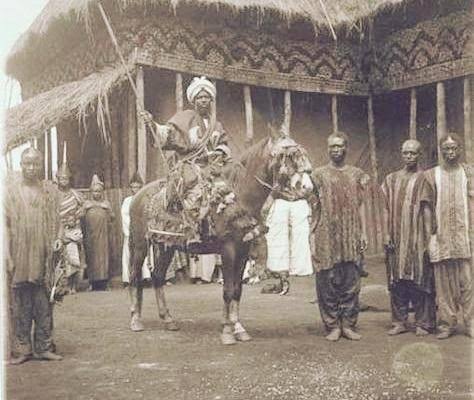In the heart of the Yoruba civilization lay the majestic Oyo Empire, a realm famed not only for its military might and wealth but also for a unique political system that balanced royal power with institutional checks. At the helm stood the Alaafin, the king and spiritual leader — a man believed to be semi-divine and the custodian of his people’s destiny.
But what happens when that power is abused? When a ruler’s pride and anger threaten the delicate fabric holding a kingdom together?
This is the story of Alaafin Ódárawu, the monarch who dared defy the mighty Oyo Mesi council and paid with his very life — in a death as ritualistic as it was brutal.
The Oyo Political System: Checks, Balances, and the Sacred Council
The Oyo Empire’s governance was strikingly sophisticated for its time. The Alaafin wielded significant influence but was far from an absolute monarch. Ódárawu’s power was counterbalanced by two powerful institutions:
1. The Oyo Mesi

The Oyo Mesi is a council of seven principal chiefs led by the Bashorun, the prime minister. This council had the authority to advise, veto, and even demand the king’s resignation through a solemn ritual.
2. The Ogboni

The Ogboni is a religious society ensuring moral and spiritual oversight over both the Alaafin and the council.
The council’s most fearsome power was its ability to symbolically reject a king by sending him an empty calabash or parrot’s egg. This act was more than an insult; it was a decree demanding the Alaafin’s ritual suicide, an ancient mechanism designed to remove tyrants while preserving the sanctity of the throne.
The Rise of Ódárawu: From Prince to Troubled King

Ódárawu was the son of the esteemed Alaafin Ajágbó and ascended the throne around the late 1650s. Unlike his father, who was remembered as a military leader and empire-builder, Ódárawu’s reign would be defined by his volatile temper and ruthlessness.
Stories passed down by Yoruba oral historians paint him as a proud and impulsive ruler who had little patience for dissent or insult. Even before he became king, as a prince and trader, he reportedly lashed out at common people who dared challenge him — a foreshadowing of his later rule.
The Market Incident: The Spark that Ignited a Kingdom’s Wrath

One of the most enduring anecdotes of Ódárawu’s reign involves a market trader in Ojo-Sẹgi, a bustling town within the empire. It is said that a vendor reprimanded him for some misconduct — an act that would usually have been shrugged off by a prince of royal blood. But Ódárawu’s pride was wounded deeply.
Upon ascending the throne, he unleashed his fury by ordering the complete destruction of Ojo-Sẹgi. The razing of the town sent shockwaves through the empire. For many, this was the first clear sign that the king’s temperament was a danger not only to townsfolk but to the stability of Oyo itself.
Clash with the Oyo Mesi: When Tyranny Meets Tradition
The destruction of Ojo-Sẹgi was the final straw for the Oyo Mesi council. The elders convened and unanimously agreed that the Alaafin had overstepped his bounds. Ódárawu’s actions were seen as vindictive and tyrannical, undermining the balance of power and the social contract binding ruler and people.
With solemn ceremony, the council presented Ódárawu with the empty calabash, the sacred symbol of rejection. This was a declaration that the Alaafin was no longer fit to rule and must submit to the ancient custom of ritual suicide to preserve the empire’s moral and political order.
The Ritual of Death: Suicide or Defiance?
Historical accounts vary on how Ódárawu met his end. Some say he accepted the council’s judgment and committed suicide, honoring the tradition that no king should outlive his rejection. Others hint that he resisted, perhaps attempting to cling to power, but was ultimately forced to submit.
Regardless of the exact details, the fact remains that Ódárawu’s death was not merely a political act but a deeply symbolic ritual — a blood price paid to restore balance to the kingdom.
Aftermath: The Precedent That Shook the Empire
Ódárawu’s forced demise was unprecedented. He was the first Alaafin known to have been formally deposed by the Oyo Mesi, setting a precedent that no monarch, however exalted, was above the law.
His successor, Alaafin Kanran, inherited a throne fraught with tension and distrust. Kanran himself would be remembered as a cruel king and met a violent end after refusing to comply with the ritual demands of the council — a testament to the fraught nature of royal power in Oyo.
This pattern of deposition and ritual execution became a recurrent theme in Oyo history, reflecting the empire’s unique but fragile system of governance.
Political Reflections: Power, Accountability, and the Limits of Kingship
The story of Ódárawu offers profound lessons about governance:
Power is not absolute: Even a king’s might was curbed by institutional checks.
Moral leadership is crucial: The Oyo political order demanded rulers who acted justly.
Ritual and symbolism sustain social order: The calabash and suicide ritual were tools to enforce accountability without plunging the empire into chaos.
Yet, the repeated deposition of kings also exposed weaknesses. The delicate balance sometimes tipped into instability, inviting internal conflict and weakening royal authority over time.
Legacy and Lessons: Ódárawu’s Enduring Place in Yoruba History
Ódárawu’s tragic tale has echoed through generations of Yoruba oral tradition, folklore, and history. He is remembered both as a cautionary figure — the king undone by pride and cruelty — and as a symbol of the power of collective governance.
In contemporary discussions on leadership, Ódárawu’s story reminds us that:
- Unchecked authority breeds downfall.
- Leadership demands humility, respect for tradition, and responsibility.
- Institutional safeguards, even when harsh, serve to protect the greater good.
Closing Reflections: The Blood Price of Defiance
The fate of Alaafin Ódárawu stands as a stark testament to the delicate dance of power and accountability in one of Africa’s great empires. His daring defiance of the Oyo Council was not just a personal tragedy but a turning point in the empire’s political evolution.
Through blood and ritual, the empire reasserted its principles — that leadership, no matter how exalted, must serve the people with wisdom and restraint. And in that story lies a timeless message, as relevant today as it was centuries ago.













Leave a comment